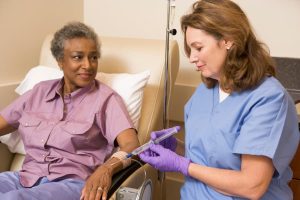
Signs of Precancerous Colon Conditions
Adenomatous polyps are a precancerous condition. They are not cancerous by themselves and are often largely harmless. Their presence, however, indicates abnormal changes to colon
HIPAA Alert: Potential Data Breach Learn More
Questions on Oncology, Hematology and/or Infusion Clinical Services due to COVID-19 Crisis – CALL 833-698-1623
Important Information for Our Patients Regarding the Coronavirus.
RCCA Providing Area Cancer Patients with Access to Care During Coronavirus Outbreak
RCCA Offering Patients Virtual Visits During Coronavirus Pandemic
Radiation therapy administered after lumpectomy or mastectomy has been shown to reduce the risk of breast cancer recurring, but the treatment can be marked by side effects and understandably raises questions for many patients.
As a radiation oncologist who treats breast cancer and a wide range of other solid tumors and blood-based malignancies, Priti Patel, MD, is accustomed to counseling patients about the therapy, including its benefits and potential adverse effects. She recently shared her insights and guidance on the topic.
The first thing I want patients facing breast cancer to know is that no concern should go unspoken and no question should go unasked,” says Dr. Patel, who practices in Red Bank, NJ with Regional Cancer Care Associates (RCCA-Hackensack), one of the nation’s largest networks of oncology specialists. “Learning that you have breast cancer can be overwhelming. As you process that news, information about your treatment plan can be a lot to take in. I want my patients to be fully informed about their care and to have confidence in their decisions. There is no such thing as a ‘silly question.’ Discussing our treatment approach, as well as the evidence and experience that guides it, is part of the comprehensive care we provide at RCCA,” she notes.

Understanding how radiation therapy works, and why it is used.
When Dr. Patel talks with a patient about radiation therapy – which also is known as radiotherapy — one of the first points she addresses is how the treatment works. “I explain that radiation therapy is an X-ray, except it’s a higher energy than a standard X-ray you might have for diagnostic purposes,” she says. “That energy is channeled into a beam directed toward its target in an extremely precise manner.” She also explains to patients that cancer cells – which reproduce faster than other cells in the body — are more susceptible to radiation than healthy cells because they have weaker DNA, the genetic material in the cell nucleus that drives cell reproduction. “Because of this weak DNA, cancer cells tend to break up when a high-energy radioactive beam strikes them,” the board-certified radiation oncologist notes.
Dr. Patel also shares with patients that the goal of radiation therapy following lumpectomy or mastectomy is to destroy any microscopic cancerous cells that may remain after surgery. “Several studies have shown a reduced rate of breast cancer recurrence, as well as a survival benefit, when radiotherapy is administered after surgery,” she notes.
As patients weigh those benefits against potential side effects, many ask whether radiation poses a risk to nearby organs, including the heart and lungs. In addressing those concerns, Dr. Patel notes that long-term heart and lung toxicity were possible adverse effects of techniques formerly used to deliver radiation to people with breast cancer. She adds that while that risk cannot be eliminated entirely, it has been significantly reduced over the last decade to less than 1-2% thanks to the development of technologies that enable radiation to be delivered with great precision. Further, she adds, radiation oncologists now can draw upon a variety of evidence-based treatment approaches – in terms of technology, patient positioning, radiation dose and schedules – to create individualized care plans that provide each patient with the maximal potential benefit with the lowest corresponding risk for side effects.
“It is our top concern as radiation oncologists to minimize exposure to any part of the body other than the breast,” says Dr. Patel, adding, “Radiation technology has come such a long way that we’ve reached a point where the local control and survival benefit far outweighs the risk to the lungs and heart.”
Common side effects – and their treatment
Dr. Patel notes that other, less-serious but still-important side effects can occur, including skin changes, fatigue, and swelling. “When these side effects do occur, they can vary significantly in their intensity, onset, and duration,” she says. The physician adds, “Most side effects resulting from radiation therapy are mild to moderate and resolve over a period of days or weeks. Further, we have effective strategies for minimizing the impact of most side effects, and our doctors and nurses are always available to discuss concerns and offer suggestions. I make sure my patients know to bring up anything that is bothersome or looks suspicious to me, one of our other physicians, the nurses, or anyone on the treatment team. Patients are seen weekly throughout treatment; however, we are present daily to address any concerns.”
In providing further detail on some of the more commonly seen adverse effects, the cancer specialist notes:
“We often refer patients experiencing lymphedema to a physical therapist with expertise in treating the condition,” Dr. Patel says. She explains that the therapist can instruct a patient in an exercise regimen that will increase lymph node drainage and relieve swelling. In other cases, the therapist may place a compression sleeve over the affected area to improve the flow of lymph.
The radiation oncologist notes that some patients may experience fibrosis — an unusual firmness in the radiated area — days to years after treatment. Exercise, stretching techniques, and massage can ease these symptoms, Dr. Patel says. She adds that if the fibrosis doesn’t respond well to those approaches, physical therapy, anti-inflammatory medications, or even additional surgery can help.
Similarly, some patients may experience tightness or a pulling sensation in the treated area days or weeks after chest wall radiation. Movement exercises and gentle massage typically can help reduce or eliminate this sensation, Dr. Patel says.
Meanwhile, while hair loss or thinning can be a consequence of radiotherapy, it occurs only in the treated area, Dr. Patel explains. “While chemotherapy and some other treatments, such as targeted therapy, may cause women to lose the hair on their heads, radiation therapy delivered to the breast would only affect the nearby area, such as the underarms,” she notes.
The bottom line
“The main thing that I want women – and men – who need radiotherapy for breast cancer to know is that the benefits far outweigh the potential adverse effects, and that we have extensive experience in avoiding, minimizing, and managing those side effects – should they occur,” Dr. Patel says. She adds, “We’re committed to providing our patients with ‘whole-person’ care. That means treating the breast cancer, of course, and using the latest therapies and technologies to eradicate the disease and prevent its recurrence. But it also means ensuring that all of a patient’s questions and concerns have been addressed, and that we effectively treat any side effects that may occur.”
*******
Dr. Patel earned her medical degree from UMDNJ New Jersey Medical School, and then completed an internship at Jersey Shore University Medical Center and her residency at New York Presbyterian Hospital – Weill Cornell Medicine in New York City. The board-certified radiation oncologist is affiliated with hospitals including Bayshore Medical Center, Jersey Shore University Medical Center, Ocean University Medical Center, and Riverview Medical Center.
Dr. Patel is one of the 90+ cancer specialists on the RCCA team. Those specialists treat patients at more than 20 RCCA care centers located throughout New Jersey, Connecticut, Maryland, and the Washington, DC, area. RCCA oncologists and hematologists see more than 23,000 new patients each year and provide care to more than 225,000 established patients, collaborating closely with their patients’ other physicians. They offer patients the latest in cutting-edge treatments, including immunotherapies and targeted therapy, as well as access to a wide range of clinical trials. In addition to serving patients who have solid tumors, blood-based cancers, and benign blood disorders such as anemia, RCCA care centers also provide infusion services to people with a number of non-oncologic conditions—including multiple sclerosis, Crohn’s disease, asthma, iron-deficiency anemia, and rheumatoid arthritis—who take intravenously-administered medications.
To learn more about RCCA, call 1-844-346-7222 or visit RCCA.com.
For more information or to schedule an appointment,
call 844-346-7222. You can also schedule an appointment by calling the RCCA location nearest you.

Adenomatous polyps are a precancerous condition. They are not cancerous by themselves and are often largely harmless. Their presence, however, indicates abnormal changes to colon

Colon cancer is among the most common cancer types diagnosed in the United States. According to colon cancer projections from the American Cancer Society, about

If you or a loved one has been diagnosed with colon cancer, identifying the treatment approach that’s best for you and your particular circumstances is

Regional Cancer Care Associates is one of fewer than 200 medical practices in the country selected to participate in the Oncology Care Model (OCM); a recent Medicare initiative aimed at improving care coordination and access to and quality of care for Medicare beneficiaries undergoing chemotherapy treatment.